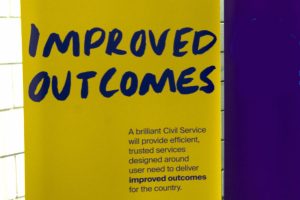
When you start talking about IT in HMRC, the numbers get pretty huge, pretty quickly. We have the largest IT estate in the UK and one of the 15 largest in the world. We have over 400 different tax systems, 5,000 servers and nearly 600 different IT applications.
This is the type of IT infrastructure we’ve needed to deliver a 24/7 online operation that works for 41 million individuals and 5 million businesses.
Like all IT systems, though, parts of ours are in need of a bit of modernisation! Chief among them is ASPIRE, the contract that since 2004 has provided the majority of our IT services. In fact, it is through ASPIRE that we collect 60% of the country’s annual £530 billion revenue. ASPIRE directly employs around 5,000 IT professionals and has an ecosystem of over 200 smaller IT businesses. Unsurprisingly, it is the biggest IT contract in government. Or perhaps, more accurately, was the biggest. Across government, we are moving away from reliance on monolithic contracts with single suppliers that tie us in for the long term. Smaller, more flexible, contracts allow us the flexibility we need to innovate and look for efficiencies in our services that benefit customers.
High stakes
 Exiting a contract of the size of ASPIRE is no small task. The Columbus programme, which is managing our exit from ASPIRE, is the largest public or private sector IT transformation programme anywhere in Europe. We’ve successfully delivered the first four stages of the programme – transitioning some services in-house, extending some key services and launching open competitions for others.
Exiting a contract of the size of ASPIRE is no small task. The Columbus programme, which is managing our exit from ASPIRE, is the largest public or private sector IT transformation programme anywhere in Europe. We’ve successfully delivered the first four stages of the programme – transitioning some services in-house, extending some key services and launching open competitions for others.
There’s no doubt that it’s a complicated programme, and that the stakes are high (making changes to anything that allows us to collect as much revenue as ASPIRE does would always involve a certain amount of risk). But it’s succeeding thanks to the fantastic leadership of our digital and commercial teams across HMRC.
The leaders of this programme have developed a robust plan that’s withstood the scrutiny of three Infrastructure and Projects Authority (IPA) project assurance reviews; four Major Projects Review Group (MPRG) panel hearings; two IPA critical-friend/readiness reviews; two full National Audit Office reviews and reports; and three Public Accounts Committee (PAC) hearings. Phew! All that scrutiny has helped in developing an approach with cross-Whitehall support and appropriate challenge, to develop a mature, deliverable approach. As well as working across Whitehall, we’re also working hand-in-glove with our private-sector partners and suppliers.
Customer benefits
 The benefits will be significant: net savings for the taxpayer of £750 million this Parliament, and a modern IT infrastructure that is much better suited to our needs and those of our customers. It's a more agile, customer-facing, integrated digital offer fit for colleagues and for our customers, the UK taxpaying public.
The benefits will be significant: net savings for the taxpayer of £750 million this Parliament, and a modern IT infrastructure that is much better suited to our needs and those of our customers. It's a more agile, customer-facing, integrated digital offer fit for colleagues and for our customers, the UK taxpaying public.
As a customer-facing organisation, our priorities need to be to maintain the quality of our customer service and the stability of our IT systems. Doing this while undergoing such a significant programme of transformation is a bit like fixing a car while driving it. The Columbus programme involves a lot of complicated tech, but its success is down to the people behind the wheel, who have repeatedly demonstrated the skills we want in modern civil servants: commitment, vision, commercial acumen and a focus on the needs of our customers. Their efforts prove, once again, that our people are our greatest resource.
There’s a clichéd view that the Civil Service can’t do big commercial and digital projects. The continuing success of Columbus proves just how out of date this view is.
Follow Jon on Twitter: @JonThompsonHMRC.
